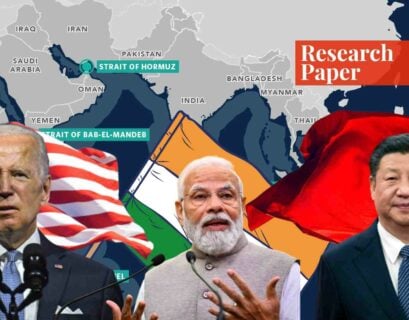Abdullah Rehman Butt is a researcher at the Centre for Aerospace & Security Studies (CASS), Islamabad, Pakistan. He can be reached at [email protected]
Revolutionizing Technology
Modern technologies and their applications have transformed human life. Some of these technologies, such as artificial intelligence (AI) and space technology, are offering groundbreaking capabilities in both civilian and military domains. Similarly, in recent years, quantum technologies have come under the limelight and piqued the interest of both government and the private sectors.
According to a Congressional Research Service report, “Quantum technology translates the principles of quantum physics into technological applications.” The technological applications of quantum physics are aimed at enhancing the computational and processing capabilities of communication infrastructure, traditional sensors, and existing computer systems exponentially by applying the concepts of quantum mechanics.
This revolution would result in improved cybersecurity, electronic materials discovery, advanced machine learning, enhanced weather forecasting, better batteries, and novel vaccine development.
The Race to Quantum Supremacy
Owing to the tremendous potential and opportunities offered by the applications of quantum technologies, several governments, and private technology companies have started investing in the research and development (R&D) of these technologies.
As per Forbes, “Google recently achieved a milestone in quantum computing by solving a problem in 200 seconds that would take a classical computer 10,000 years to solve.” Along with Google, other tech giants like Microsoft and IBM have also begun the race to dominate this sector and achieve “quantum supremacy”.

Currently, all these worldwide investments are focused upon the R&D of three major applications of quantum technologies—quantum sensing, quantum communications, and quantum computing. As a result, the size of the global quantum computing market grew to 487.4 million USD in 2021 and will touch 3728.4 million USD by 2030, with a 25.40% compound annual growth rate.
Realizing the potential impact of quantum technologies on geopolitics as well as their strategic implications in the future, states have also set up their individual quantum research programs. The global power competition and the ambitions of both the US and China to dominate this realm have increased the pace of this quantum race.
In 2016, China unveiled its national strategy to become a global technology leader ahead of the US and declared quantum technology key in this regard. In 2017, Chinese President Xi Jinping approved 10 billion USD to set up the Chinese National Laboratory for Quantum Information Sciences. With the successful test of the first-ever quantum-secured communication with its satellite under the Micius program, China has gained a visible lead in quantum communication and computing.
The US has also stepped up its endeavors to maintain its position as a global technology-superior state. In 2018, it formally started its quantum R&D program by enacting the National Quantum Initiative Act and allocated 1.2 billion USD to fund quantum research at the National Science Foundation’s (NSF) “Multidisciplinary Centers for Quantum Research and Education” and various other institutions. This fierce quantum race would have serious implications for both scientific knowledge development as well as for strategic competition at both global and regional levels.
India’s Increasing Interest in Quantum Technology
In South Asia, India and Pakistan are two nuclear-armed nations and key players in the region. India’s persistent economic growth, during the last few decades, and its political alignment with the West have emboldened it to overtly follow its expansionist designs in the region. To achieve its political and strategic objectives, it has been enhancing its military capabilities by investing heavily in advanced weapon systems and emerging disruptive technologies, including quantum technology.
In 2020, the Indian government announced an allocation of 1.12 billion USD to fund various quantum computing R&D facilities, as reported by the Office of Science and Innovation New Delhi. India has also shown clear intentions to develop and deploy quantum technologies for military purposes.
In February 2020, during an interview with Force magazine, Indian Army Chief General Naravane declared that they had “identified niche technologies of the future—AI, blockchain, quantum computing, military applications of 5G—that will enable us to lead disruptions in the strategic-military domain.”
Impact on South Asia
Though these cutting-edge technologies are still in the development phase, once mature, they will certainly put India in an advantageous position over Pakistan in any future conflict-like situation. The Indian quantum capabilities, along with its military AI capabilities, will improve its radars and detection systems by enabling the detection of stealth fighter jets. It will also considerably improve submarine detection systems posing a serious threat to the survivability of India’s sea-based nuclear deterrent.
Quantum-enabled remote sensing satellites will enhance the Indian military’s ISR (intelligence, surveillance, and reconnaissance), cyber warfare, electronic warfare, and precision strike capabilities. Advancements in disruptive capabilities (quantum, AI, and space) and the acquisition of modern weapons systems will have serious consequences for strategic stability as well as crisis stability in South Asia.
Conclusion
Given its fragile economic conditions, Pakistan has not been able to achieve much in the quantum domain. It is high time for the country to start investing in the research and development of quantum technologies for its national development and to offset the Indian military advancements in this area. At the international level, the quantum technologies race between the US and China has made it imperative to develop a mutually agreed and comprehensive framework to control and regulate quantum technologies. The framework would allow accruing maximum benefits for mankind, and to prevent their misuse.
If you want to submit your articles and/or research papers, please check the Submissions page.
The views and opinions expressed in this article/paper are the author’s own and do not necessarily reflect the editorial position of Paradigm Shift.



















